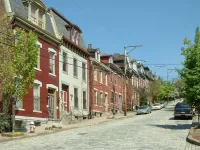Waco, located in central Texas between Dallas and Austin, is the county seat of McLennan County. As of 2023, the city's estimated population is 144,816, ranking it 24th in Texas. The Waco metropolitan statistical area, encompassing McLennan, Falls, and Bosque counties, has a population of 304,865. Bosque County was recently added to the MSA in 2023.
1902: Texas Christian University Renames and Relocates
In 1902, Add-Ran Christian University in Waco changed its name to Texas Christian University (TCU).
1902: Waco Tribe Gains US Citizenship
In 1902, the Waco tribe received land allotments and became official citizens of the United States.
1905: Lynching of Sank Majors
In 1905, Sank Majors, an African American man, was lynched by a white mob on the Washington Avenue Bridge in Waco. The mob, aided by Texas Rangers, also attacked Jim Lawyer for protesting the lynching.
1910: Fire Destroys TCU Building, Leading to Relocation
In 1910, a fire destroyed the main building of Texas Christian University (TCU) in Waco. The city of Fort Worth offered TCU a 50-acre campus and $200,000 to relocate, which the university accepted.
1910: ALICO Building Completed
The ALICO Building, a 22-story skyscraper, was completed in 1910 and became the tallest building in Waco.
1910: Cotton Palace Rebuilt After Fire
The Cotton Palace, a prominent fair and exhibition center in Waco, was destroyed by fire and subsequently rebuilt in 1910.
1916: Lynching of Jesse Washington
In 1916, Jesse Washington, a Black teenager, was brutally tortured, mutilated, and burned to death by a mob in Waco's town square. The horrific event, witnessed by about 15,000 people, drew international condemnation and fueled the NAACP's anti-lynching campaign.
May 26, 1922: Lynching of Jesse Thomas
On May 26, 1922, Jesse Thomas was shot, dragged through the streets by a mob of approximately 6,000 people, and burned in Waco's public square. This event highlighted the ongoing racial tensions despite attempts to address mob violence.
1923: Sheriff Protects Roy Mitchell from Lynching and Last Public Execution in Texas
In 1923, Waco's sheriff, Leslie Stegall, protected Roy Mitchell, an African American man coerced into confessing to murders, from being lynched. Mitchell became the last person publicly executed and hanged in Texas before the electric chair's introduction.
June 20, 1930: First Night Game in Texas League History
On June 20, 1930, a groundbreaking event took place at Katy Park in Waco as the first-ever night game in Texas League history was played. The illumination for this momentous occasion was generously provided by Waco resident Charles Redding Turner, the owner of a local farm team that served as a pipeline for aspiring players to the Chicago Cubs.
August 6, 1930: Baseball History at Katy Park
On August 6, 1930, at Katy Park, Waco left fielder Gene Rye became the only player in professional baseball history to hit three home runs in one inning during a game against Beaumont.
1930: End of an Era for the Texas League in Waco
The year 1930 marked the end of Waco's participation in the Texas League. However, the city continued to field strong semi-pro teams in the 1930s and early 1940s.
1931: Closure of Cotton Palace Exposition
The annual Cotton Palace exposition in Waco succumbed to the economic pressures of the Great Depression and closed in 1931, leading to the demolition of the building.
1933: Texas' First Traffic Circle Causes Stir in Waco
Waco made transportation history in 1933 with the construction of Texas' first traffic circle at the intersection of US 81 and US 77. This novel intersection initially caused confusion and frustration among drivers, even leading to lawsuits.
1937: Creation of Big Red Soda
Grover C. Thomsen and R. H. Roark invented a soft drink named "Sun Tang Red Cream Soda" in Waco in 1937, which would later become known as Big Red.
May 5, 1942: Waco Army Air Field Opens
The Waco Army Air Field commenced operations on May 5, 1942, serving as a basic pilot training school.
1945: Death of Col. James T. Connally
Col. James T. Connally, a pilot from Waco, was killed in Japan in 1945.
1947: The Big State League Welcomes Waco
The Class B level Big State League, with Waco as a member called the Waco Dons, was formed in 1947.
1948: The Pittsburgh Pirates Come to Waco
In 1948, A.H. Kirksey, owner of Katy Park, convinced the Pittsburgh Pirates to take over the Waco baseball team. The team's name was changed to the Pirates.
January 31, 1949: Record Low Temperature in Waco
On January 31, 1949, Waco experienced its lowest temperature ever recorded, plummeting to a frigid -5°F (-21°C).
June 10, 1949: Renaming to Connally Air Force Base
The Waco Army Air Field was renamed Connally Air Force Base on June 10, 1949, in honor of Col. James T. Connally, a local pilot who died in Japan in 1945.
1949: Waco Pirates Clinch League Championship
The Waco Pirates, despite dropping to fourth place during the regular season, emerged victorious in the playoffs to secure the league championship in 1949.
1951: Base Renamed to James Connally Air Force Base
Connally Air Force Base in Waco underwent another name change in 1951, becoming the James Connally Air Force Base.
1951: Founding of American Income Life Insurance Company
Harold Goodman established the American Income Life Insurance Company in Waco in 1951.
1952: Waco Pirates Struggle in the League
The Waco Pirates faced a challenging season in 1952, finishing with a dismal record of 29-118, marking one of the worst performances by a full-season team in the 20th century.
May 11, 1953: Devastating Tornado Strikes Waco
A powerful F5 tornado devastated downtown Waco on May 11, 1953, resulting in the loss of 114 lives.
1953: Tornado Devastates Katy Park, Forcing Relocation
Tragedy struck in 1953 when a tornado caused significant damage to Katy Park, forcing the Waco Pirates to relocate to Longview for the remainder of the season.
1964: Texas Ranger Hall of Fame and Museum Established
In 1964, Waco, Texas was chosen by the Texas Department of Public Safety as the location for the state's official museum dedicated to the Texas Rangers, a legendary law enforcement agency established in 1823.
1965: Establishment of Texas State Technical Institute
Texas State Technical Institute, later renamed Texas State Technical College, was established in 1965 on the site of the former James Connally Air Force Base.
May 1966: Closure of James Connally Air Force Base
James Connally Air Force Base in Waco closed in May 1966. The site was repurposed and became home to Texas State Technical College.
1971: Waco Suspension Bridge Closes to Vehicle Traffic
The Waco Suspension Bridge was restricted to pedestrian traffic only in 1971 and was listed on the National Register of Historic Places, preserving its historical significance.
1976: Texas Ranger Hall of Fame and Museum Expanded
The Texas Rangers museum in Waco was expanded in 1976 and officially designated as the Texas Ranger Hall of Fame and Museum.
1978: Waco Mammoth National Monument
The discovery of 68,000-year-old mammoth bones occurred in 1978 at the intersection of the Brazos and Bosque Rivers in Waco. The site yielded remains of at least 24 mammoths, a camel, and a large cat, making it a significant paleontological find. The Waco Mammoth National Monument, a part of the National Park Service, now houses these remarkable fossils.
February 28, 1993: Waco Siege Begins
On February 28, 1993, a deadly shootout erupted at the Branch Davidians' Mt. Carmel compound near Waco, resulting in the deaths of six Branch Davidians and four agents from the U.S. Bureau of Alcohol, Tobacco, and Firearms. This event marked the beginning of a 51-day standoff between the Branch Davidians and federal law enforcement.
April 19, 1993: Waco Siege Ends in Tragedy
On April 19, 1993, the Waco siege reached a tragic conclusion when the Branch Davidians' Mt. Carmel compound, located 13 miles from Waco, was engulfed in flames. This devastating fire claimed the lives of 74 individuals, including the group's leader, David Koresh.
2000: 2000 United States Census (Race and Ethnicity)
According to the 2000 United States Census, the racial composition of Waco, Texas was 60.8% White, 22.7% African American, 1.4% Asian, 0.5% Native American, 0.1% Pacific Islander, 12.4% from other races, and 2.3% from two or more races. Hispanics or Latinos of any race constituted 23.6% of the population.
2003: Closure of Strecker Museum in Waco
The Strecker Museum, the oldest continuously operating museum in Texas, housed at Baylor University in Waco, closed in 2003. Its collections were relocated to the Mayborn Museum Complex.
2004: Tornado Memorial Erected in Downtown Waco
A granite monument honoring the victims of the 1953 Waco tornado, inscribed with their names, was placed in downtown Waco in 2004.
2006: Waco City Council Condemns 1916 Lynching
The Waco City Council formally condemned the 1916 lynching of Jesse Washington in 2006, acknowledging the lack of opposition from local leaders at the time.
2009: Cameron Park Trail System Achieves National Recognition
In a testament to its natural beauty and recreational value, the Cameron Park Trail System received national recognition in 2009 when the US Department of the Interior designated it as a National Recreation Trail.
2010: 2010 United States Census
The 2010 United States Census documented a population of 124,805 individuals residing in Waco, Texas.
2011: Waco Tornado Remains One of the Deadliest
As of 2011, the 1953 Waco tornado remained the 11th deadliest tornado in US history and tied for the deadliest in Texas history.
2013: Lone Star Adorns Waco's Historic Traffic Circle
In 2013, Waco's iconic traffic circle, a symbol of the city's transportation history, received a distinctive addition: a lone star placed at its center.
May 17, 2015: Twin Peaks Shootout
On May 17, 2015, a violent confrontation between rival biker gangs at the Twin Peaks restaurant in Waco resulted in a tragic shootout. Waco police intervened in the clash, which left nine people dead and 18 injured. Over 170 individuals were arrested in connection with the incident. This event stands as the deadliest shootout in Waco's history.
May 15, 2016: Waco Mayor Apologizes for 1916 Lynching
On May 15, 2016, the mayor of Waco issued a formal apology to descendants of Jesse Washington for his lynching in 1916. This event marked the centenary of the horrific incident.
2016: Removal of Segregation Fence at Greenwood Cemetery
A fence separating Black and white graves at Greenwood Cemetery, a symbol of racial segregation established in the 1870s, was removed in 2016.
2016: Waco Sides with Trump in Presidential Election
In the 2016 Presidential Election, Waco showed its support for Donald Trump, aligning with the Republican candidate.
2018: Inaugural Ironman 70.3 Waco
On October 26, 2018, Waco hosted the first-ever Bicycle World Texas Ironman 70.3, marking a significant event in the city's history.
2018: Enhancements Improve Traffic Flow at Waco's Traffic Circle
To address ongoing traffic flow challenges and enhance driver experience, Waco implemented improvements to its historic traffic circle in 2018. These enhancements included new lane markings and signage designed to provide clearer guidance for motorists.
2020: Population Count for Waco Metropolitan Area
The Waco metropolitan statistical area, comprising McLennan, Falls, and Bosque counties, recorded a population of 295,782 in 2020.
2023: Population Growth and Metropolitan Expansion
In 2023, Waco, Texas, had an estimated population of 144,816, making it the 24th most populous city in Texas. The Waco metropolitan area, including McLennan, Falls, and Bosque counties, reached a population of 304,865 in 2023.
Mentioned in this timeline

Donald John Trump is an American politician media personality and...

Joe Biden is an American politician who served as the...
Japan is an East Asian island country located in the...

Chicago is the most populous city in Illinois and the...

A tornado is a rotating column of air connecting the...

Pittsburgh is a city in southwestern Pennsylvania situated at the...
Trending

50 minutes ago Storm Causes Power Outages Across Central Coast and SLO County, Bringing Down Trees

2 hours ago Iva Jovic triumphs over Rakhimova in Dubai, reveals Pegula observation.

2 hours ago Andreeva vs. Cristian: WTA Dubai 2026 Prediction, Odds, and Match Preview.

2 hours ago Mirra Andreeva embraces attention, aims Dubai title defense, draws inspiration from LeBron James.

3 hours ago Severe Thunderstorm Warning Issued for Central California; Funnel Clouds Possible, Gusty Showers Expected

3 hours ago Iva Jovic Observed Jessica Pegula; Jovic Wins in Dubai First Round.
Popular

Jesse Jackson is an American civil rights activist politician and...
Randall Adam Fine is an American politician a Republican who...

Pam Bondi is an American attorney lobbyist and politician currently...

Barack Obama the th U S President - was the...

Kid Rock born Robert James Ritchie is an American musician...

XXXTentacion born Jahseh Dwayne Ricardo Onfroy was a controversial yet...
